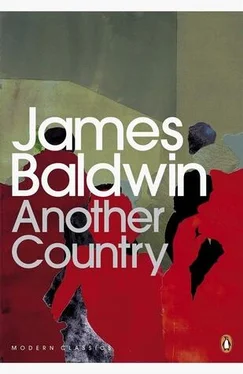And he thought of these men, that ignorant army. They were husbands, they were fathers, gangsters, football players, rovers; and they were everywhere. Or they were, in any case, in all of the places he had been assured they could not be found and the need they brought to him was one they scarcely knew they had, which they spent their lives denying, which overtook and drugged them, making their limbs as heavy as those of sleepers or drowning bathers, and which could only be satisfied in the shameful, the punishing dark, and quickly, with flight and aversion as the issue of the act. They fled, with the infection lanced but with the root of the infection still in them. Days or weeks or months might pass — or even years — before, once again, furtively, in an empty locker room, on an empty stairway or a roof, in the shadow of a wall in the park, in a parked car, or in the furnished room of an absent friend, they surrendered to the hands, to the stroking and fondling and kissing of the despised and anonymous sex. And yet the need did not seem to be predominantly physical. It could not be said that they were attracted to men. They did not make love, they were passive, they were acted on. The need seemed, indeed, to be precisely this passivity, this gift of illicit pleasure, this adoration. They came, this army, not out of joy but out of poverty, and in the most tremendous ignorance. Something had been frozen in them, the root of their affections had been frozen, so that they could no longer accept affection, though it was from this lack that they were perishing. The dark submission was the shadow of love — if only someone, somewhere, loved them enough to caress them this way, in the light, with joy! But then they could no longer be passive.
Chaos. For the great difference between these men and himself was also the terms of their connection. He saw their vulnerability and they saw his. But they did not love him for this. They used him. He did not love them, either, though he dreamed of it. And the encounter took place, at last, between two dreamers, neither of whom could wake the other, except for the bitterest and briefest of seconds. Then sleep descended again, the search continued, chaos came again.
And there was more to it than that. When the liaison so casually begun survived the first encounters, when a kind of shy affection began to force itself up through the frozen ground, and shame abated, chaos more than ever ruled. For shame had not so much abated as found a partner. Affection had appeared, but through a fissure, a crevice, in the person, through which, behind affection, came all the winds of fear. For the act of love is a confession. One lies about the body but the body does not lie about itself; it cannot lie about the force which drives it. And Eric had discovered, inevitably, the truth about many men, who then wished to drive Eric and the truth together out of the world.
And where was honor in all this chaos? He watched the winking lights and listened to Yves and Madame Belet in the kitchen. Honor. He knew that he had no honor which the world could recognize. His life, passions, trials, loves, were, at worst, filth, and, at best, disease in the eyes of the world, and crimes in the eyes of his countrymen. There were no standards for him except those he could make for himself. There were no standards for him because he could not accept the definitions, the hideously mechanical jargon of the age. He saw no one around him worth his envy, did not believe in the vast, gray sleep which was called security, did not believe in the cures, panaceas, and slogans which afflicted the world he knew; and this meant that he had to create his standards and make up his definitions as he went along. It was up to him to find out who he was, and it was his necessity to do this, so far as the witchdoctors of the time were concerned, alone.
“ Mais, bien sûr, ” he heard Yves saying to Madame Belet, “ je suis tout à fait à votre avis .” Madame Belet was very fond of Yves and gave him the benefit, entirely unsolicited, of her seventy-two years’ experience each time she was able to corner him. He could see Yves now, in the kitchen, holding the two drinks in his hand, edging toward the door, a pale, polite, and lonely smile on his face — for he had great respect for old people — waiting for the pause in Madame Belet’s flow which would allow him to escape.
Madame Belet was fond of Eric, too, but he had the feeling that this was mainly because she recognized him as Yves’ somewhat unlikely benefactor. If Eric had been French, she would have despised him. But France did not, Dieu merci! produce such conundrums as Eric, and he was not to be judged by the civilized standards which obtained in her own country.
“And what time are you leaving?” she asked.
“Oh, surely not before noon, Madame.”
She laughed and Yves laughed. There was something bawdy in their laughter and he could not avoid the feeling, though he suppressed it at once, that they were laughing in league, against him. “I hope you will like America,” said Madame Belet.
“I will become very rich there,” said Yves, “and when I come back, I will take you on a pilgrimage to Rome.”
For Madame Belet was devout and had never been to Rome, and it was her great hope to see the Holy City before she died.
“Ah. You will never come back.”
“I will come back,” Yves said. But his voice was full of doubt. And Eric realized, for the first time, that Yves was afraid.
“People who go to America,” said Madame Belet, “never come back.”
“ Au contraire, ” said Yves, “they are coming back all the time.”
Coming back to what? Eric asked himself. Madame Belet laughed again. Then their voices dropped. Yves came back into the room. He handed Eric his drink and sat again on the hassock, with his head on Eric’s knee.
“I thought I would never get away,” he murmured.
“I was thinking of going in to rescue you.” He leaned down and kissed Yves on the neck.
Yves put one hand on Eric’s cheek and closed his eyes. They were still. A pulse beat in Yves’ neck. He turned and he and Eric kissed each other on the mouth. They pulled slightly away. Yves’ eyes were very black and bright in the unlit, leaping room. They stared into each other’s eyes for a long time, and kissed again. Then Eric sighed and leaned back and Yves rested once more against him.
Eric wondered what Yves was thinking. Yves’ eyes had carried him back to that moment, nearly two years before, when, in a darkened hotel room, in the town of Chartres, he and Yves had first become lovers. Yves had visited the cathedral once, years before, and he had wanted Eric to see it. And this gesture, this desire to share with Eric something he had loved, marked the end of a testing period, signaled Yves’ turning out of that dark distrust with which he was accustomed to regard the world and with which he had held Eric at bay. They had known each other for more than three months and had seen each other every day, but they had never touched.
And Eric had waited, attentive and utterly chaste. The change in him was like the change in a spendthrift when his attention is captured by something worth more than all his gold, worth more than all the baubles he has ever purchased; then, instead of scattering, he begins to assess and hoard and gather up; all that he has becomes valuable because all that he has may prove to be an unacceptable sacrifice. So Eric waited, praying that this violated urchin would learn to love and trust him. And he knew that the only way he could hope to bring this about was to cease violating himself: if he did not love himself, then Yves would never be able to love him, either.
So he did what he alone could do, purified, as well as he could, his house, and opened his doors; established a precarious order in the heart of his chaos; and waited for his guest.
Читать дальше












